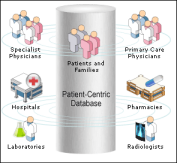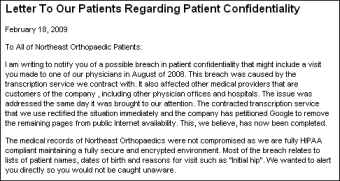Intelligent Healthcare Information Integration 3/2/09
U.S. Healthcare Overhaul? Sure … in 5 Easy Steps!
The unfettered free market system has done about as well for Healthcare as it did for its cousin, Finance. I personally believe in capitalism, but perhaps guided capitalism is necessary when universal concerns are involved (to corral the misguided – right, Mr. Madoff?) It appears to me that without some form of nationalized healthcare supervision (the dreaded ‘socialized’ medicine monster?) it is unclear if we will ever stop digging deeper this healthcare hole. Exactly what form of federal regulation and to what extent we need it is controversial, but I do know we must address the problem, preferably with some new, creative thought.
With this in mind, my dear Mr. Obama, et al, I here offer up the …
“Official Grunt-in-the-Trenches Complete U.S. Healthcare System Overhaul and National Health Information Network in Five Easy Steps Disruptive Innovation Package”
…for your review and consideration.
As this is a blog spot and not my personal manifesto home page (now there’s an idea!) I will offer the steps to Healthcare Nirvana as a serial blog, limiting each rant …er, discussion …to one of the component steps.
STEP ONE
Living Your Name – What to do with HMOs, MCOs, & Inscos
Health Maintenance Organizations – HMOs, Managed Care Organizations – MCOs, and Health Insurance Companies: read the names and forget your now ingrained biases. Don’t the names themselves actually imply something pretty desirable? Isn’t the goal of U.S. healthcare overhaul as a whole, and the National Health Information Network as a subunit thereof, actually seeking to provide better healthcare maintenance and management for the every U.S. citizen, both those who can and those who cannot afford it?
Unfortunately, such organizations have evolved (devolved?) into entities less concerned with helping maintain and manage quality care services than they are about maintaining and managing profit margins and bottom lines. With constant focus on cost containment, earnings, and shareholder happiness, how can we expect them to have much room left for actual patient care concerns? (Personally, I generally avoid talking about providing healthcare to patients as all patients are people and “they is us.” Somehow, categorizing people as patients adds a degree of distancing I find distasteful).
Health insurance companies are, at least, less evasive about their agendas; they are about money, period.
It is a fact that HMOs, MCOs, and health insurance companies are a gigantic part of our current economic system, not just healthcare. When considering our currently distressed jobs and economic picture as a whole, they are important and integral considerations. The entire economic structure is in need of a major tune up and, most talking heads agree, an “overhaul” of the current U.S. healthcare quagmire is crucial to the success of our recovery. I suggest an adjustment in our thinking might provide us some helpful wrenches for the servicing we need on them all.
Problem One: Corporate profits, not people’s health, have become preeminent
As we are seeking to improve the healthcare and the efficiency of its provision for all Americans, let’s prioritize that as “Job One”. Yes, we are a capitalistic society and I, for one, have no desire to see healthcare socialized. But, to achieve the better “bang for the buck” that we all know we need here, I propose that the goal of quality care for all Americans be kept preeminently in view and all other considerations become subservient to that goal. Thus, I propose a redefining of the term “health maintenance organization,” a redirection of healthcare’s middlemen, and a retraining of their workforce to maintain (or even create) jobs and begin improving the efficiency of healthcare provision using current tools. (Not to worry; geeky techno-tools will be promoted soon!)
Answer One: Live Your Name
As both a “grunt in the trenches” solo physician and as one of the American people who has health that needs care, I would love to have the assistance of a health maintenance organization to help me manage the overwhelming information and requirements modern healthcare entails. If my health info was better organized, shared, and managed, I have no doubt I could better help both the people I treat and myself.
Current competing and conflicting procedure approvals, payment choices, formulary differences, and other issues separating the major middlemen corporations only serve to confuse, complicate and “chaotisize” healthcare…not to mention the effect upon accelerating costs.
Suppose there was one acceptable formulary structure, that quality measures could be promoted universally, that health maintenance care was paid better than (or, at least as well as) health repair, that our struggles with healthcare provision were about improving “best practices” not “best reimbursements.”
How about retraining many of those current so-called “HMO” (or other middlemen) employees – and their bosses! – to help guide and support quality healthcare decisions? If they weren’t spending their time fighting for profits, we could use them to actually help “health maintenance” such as:
1. Helping people with
a. Appointment reminders
b. Test and procedure prompts
c. Vaccinations schedules
d. Finding appropriate services
2. Helping providers with
a. Information organization
b. Credentialing
c. Group pricing and supplies tracking
d. Care plans and protocols
e. Patient compliance support
3. Helping researchers and epidemiologists with
a. Data tracking and coalescence
b. Disease monitoring
c. Large prospective studies
d. Best practices design and follow-up
With a uniform set of payment and approval guidelines, most of the people who now spend their time “delaying, denying, and defending” in order to enhance healthcare’s middlemen profits could begin to “unite, support, and assimilate” (USA!) healthcare information to enhance actual healthcare provision. We can’t afford to simply eliminate these giant middlemen of medicine, even if their amazing corporate headquarters of marble and mahogany spit in the face of their initial role to curtail healthcare costs. We need their workforce and brainpower, just redirected towards actually helping healthcare instead of sucking off its marrow.
Health maintenance organizations, managed care organizations, and health insurance providers – helping doctors provide care, not dictating care provision, and, actually living up to their names. Scandaleux, oui?
Still to come:
Step 2: Two Thirds of the NHIN by 2010
Step 3: Equalizing the Playing Field (“Open” is not a Four Letter Word)
Step 4: EHR? PHR? Phooey! How About an IHR
Step 5: Verdant Health

Dr. Gregg Alexander is a grunt-in-the-trenches pediatrician and geek. His personal manifesto home page…er..blog…yeh, that’s it, his blog – and he – can be reached through http://madisonpediatric.com or doc@madisonpediatric.com.






Re: Walmart Health: Just had a great dental visit this morning, which was preceded by helpful reminders from Epic, and…